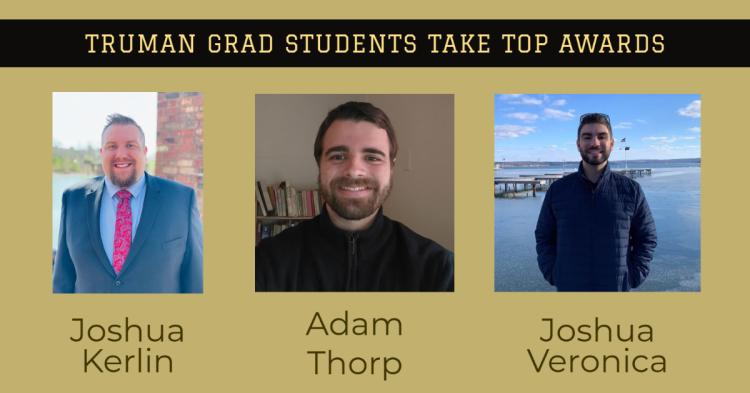
The Harry S Truman School of Public Affairs at the University of Missouri has good reason to celebrate. Three of its grad students recently won top honors in the “2021 NASPAA-Batten Student Simulation Competition: The Pandemic Game 2.0,” and two are going on to represent the university in a global competition.
More than 400 students from 120 universities in 30 countries at four global sites participated. The four winning first-place teams will move forward to an “All Star” round, where a panel of prominent judges will identify the global winner.
Mizzou was the only school with two students on first place teams, says Leanne Tippet Mosby, Truman School’s program manager of Student Support Services.
Mizzou winners — Joshua Kerlin, Adam Thorp, and Joshua Veronica — were part of placing teams, each comprised of peers from other universities.
Kerlin and Thorp were on first place teams, and Joshua Veronica was on a third-place team at the Feb. 27 day-long virtual event. A second competition was held March 6.
Both competitions were designed to test grad students’ skills on how to control a Covid-19-like pandemic outbreak. Students decided what policies to implement using real-world data, in a stimulation built by the University of Virginia Center for Leadership and Gaming. Other skills used include leadership, negotiation, and critical thinking.
Thorp says they competed in two rounds, each of which put them in the position of government officials in a fictional nation handling a fast-spreading pandemic. “We had to set up the country’s policies, and communicate with our neighbors — the other teams — in an effort to keep deaths down while keeping an eye on the effects our policies had on our country’s budget, economy and public opinion.”
“This simulation was an opportunity to apply what we learn in class to real-world policymaking scenarios,” says Veronica. “Often, in responding to crisis, there is no playbook and not much time to plan. I participated because I wanted the chance to hone these skills and learn from others in the field.”
Kerlin — who has a public safety background — say his current skillset made him a good candidate for the contest. “I have learned so much at the Truman School of Public Affairs,” he says. “And I wanted to put my knowledge to the test in an real-world setting.”
Joshua Kerlin says his team focused on keys strategies — such as international communication and racial equity — which contributed to their success.
Kerlin says his team focused on keys strategies — such as international communication and racial equity — which contributed to their success.
“There were four teams per ‘world’ with multiple ‘worlds’ competing each round,” he explains. “our world consistently relied on providing timely updates to each other via our Minister of Communications. When one country had a spike in infections or had trouble containing, they let us know so that we could restrict travel and make changes accordingly…. We wanted to ensure that our economic impacts were not disproportionally affecting lower social classes.”
Thorp has similar strategies: His team responded aggressively to the first signs of infection, he recalls. For example, they shut down their borders with their neighboring country, though agreed to reopen when the other country had eliminated the virus in theirs. “By preventing the beginning of exponential spread, we were able to totally open our country back up before too long.”
Thorp says the teams learned, after the simulations ended, the game was modeled using actual data from the coronavirus. “This was good to hear,” he says. “We had based our strategy on our own knowledge of successful policy responses to the coronavirus pandemic.”
Teamwork was truly the key to success here. It is an incredible feeling. There are so many incredibly talented students that competed in the first simulation. I am privileged to compete against the talented international students at the global competition. - Joshua Kerlin
Kerlin says he was proud to represent Mizzou, and thrilled to be selected for the final level of competition. “Teamwork was truly the key to success here,” he says. “It is an incredible feeling. There are so many incredibly talented students that competed in the first simulation. I am privileged to compete against the talented international students at the global competition.
“I want to say how talented my teammates are and that this victory is because of our combined contributions and knowledge,” Kerlin adds. “I also want to thank the faculty and staff at TSPA for giving me the knowledge to be successful in this competition. This is just another example of how great of a university Mizzou is and how happy I am that I chose TSPA for my graduate education.”
I would do it again. The simulation is a unique way to test the impact of public policy, so it was an interesting and informative experience. I’m very proud of my Mizzou students for their success, and I know they will represent MU well in the finals. - Joshua Veronica
“I would do it again,” adds Veronica. “The simulation is a unique way to test the impact of public policy, so it was an interesting and informative experience. I’m very proud of my Mizzou students for their success, and I know they will represent MU well in the finals.”
NASPAA, otherwise known as the Network of Schools of Public Policy, Affairs, and Administration, is a Washington, D.C. based nonprofit accreditation and teaching organization, founded in 1970. It considers itself the global standard in public service education.